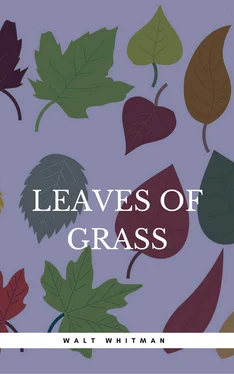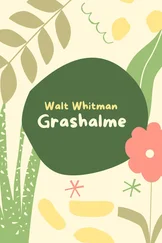Walt Whitman - Leaves of Grass
Здесь есть возможность читать онлайн «Walt Whitman - Leaves of Grass» — ознакомительный отрывок электронной книги совершенно бесплатно, а после прочтения отрывка купить полную версию. В некоторых случаях можно слушать аудио, скачать через торрент в формате fb2 и присутствует краткое содержание. ISBN: , Жанр: Языкознание, Критика, на английском языке. Описание произведения, (предисловие) а так же отзывы посетителей доступны на портале библиотеки ЛибКат.
- Название:Leaves of Grass
- Автор:
- Жанр:
- Год:неизвестен
- ISBN:9782377930524
- Рейтинг книги:4 / 5. Голосов: 1
-
Избранное:Добавить в избранное
- Отзывы:
-
Ваша оценка:
- 80
- 1
- 2
- 3
- 4
- 5
Leaves of Grass: краткое содержание, описание и аннотация
Предлагаем к чтению аннотацию, описание, краткое содержание или предисловие (зависит от того, что написал сам автор книги «Leaves of Grass»). Если вы не нашли необходимую информацию о книге — напишите в комментариях, мы постараемся отыскать её.
Leaves of Grass — читать онлайн ознакомительный отрывок
Ниже представлен текст книги, разбитый по страницам. Система сохранения места последней прочитанной страницы, позволяет с удобством читать онлайн бесплатно книгу «Leaves of Grass», без необходимости каждый раз заново искать на чём Вы остановились. Поставьте закладку, и сможете в любой момент перейти на страницу, на которой закончили чтение.
Интервал:
Закладка:
How bright shine the foremost with cutlasses,
Every man holds his revolver . . . . marching stiff through Boston town.
A fog follows . . . . antiques of the same come limping,
Some appear wooden-legged and some appear bandaged and bloodless.
Why this is a show! It has called the dead out of the earth,
The old graveyards of the hills have hurried to see;
Uncountable phantoms gather by flank and rear of it,
Cocked hats of mothy mould and crutches made of mist,
Arms in slings and old men leaning on young men’s shoulders.
What troubles you, Yankee phantoms? What is all this chattering of bare gums?
Does the ague convulse your limbs? Do you mistake your crutches for firelocks, and level them?
If you blind your eyes with tears you will not see the President’s marshal,
If you groan such groans you might balk the government cannon.
For shame old maniacs! . . . . Bring down those tossed arms, and let your white hair be;
Here gape your smart grandsons . . . . their wives gaze at them from the windows,
See how well-dressed . . . . see how orderly they conduct themselves.
Worse and worse . . . . Can’t you stand it? Are you retreating?
Is this hour with the living too dead for you?
Retreat then! Pell-mell! . . . . Back to the hills, old limpers!
I do not think you belong here anyhow.
But there is one thing that belongs here . . . . Shall I tell you what it is, gentlemen of Boston?
I will whisper it to the Mayor . . . . he shall send a committee to England,
They shall get a grant from the Parliament, and go with a cart to the royal vault,
Dig out King George’s coffin . . . . unwrap him quick from the graveclothes . . . . box up his bones for a journey:
Find a swift Yankee clipper . . . . here is freight for you blackbellied clipper,
Up with your anchor! shake out your sails! . . . . steer straight toward Boston bay.
Now call the President’s marshal again, and bring out the government cannon,
And fetch home the roarers from Congress, and make another procession and guard it with foot and dragoons.
Here is a centrepiece for them:
Look! all orderly citizens . . . . look from the windows women.
The committee open the box and set up the regal ribs and glue those that will not stay,
And clap the skull on top of the ribs, and clap a crown on top of the skull.
You have got your revenge old buster! . . . . The crown is come to its own and more than its own.
Stick your hands in your pockets Jonathan . . . . you are a made man from this day,
You are mighty cute . . . . and here is one of your bargains.
1855:10
There was a child went forth every day,
And the first object he looked upon and received with wonder or pity or love or dread, that object he became,
And that object became part of him for the day or a certain part of the day . . . . or for many years or stretching cycles of years.
The early lilacs became part of this child,
And grass, and white and red morningglories, and white and red clover, and the song of the phoebe-bird,
And the March-born lambs, and the sow’s pink-faint litter, and the mare’s foal, and the cow’s calf, and the noisy brood of the barnyard or by the mire of the pond-side . . and the fish suspending themselves so curiously below there . . and the beautiful curious liquid . . and the water-plants with their graceful flat heads . . all became part of him.
And the field-sprouts of April and May became part of him . . . . wintergrain sprouts, and those of the light-yellow corn, and of the esculent roots of the garden,
And the appletrees covered with blossoms, and the fruit afterward . . . . and wood-berries . . and the commonest weeds by the road;
And the old drunkard staggering home from the outhouse of the tavern whence he had lately risen,
And the schoolmistress that passed on her way to the school . . and the friendly boys that passed . . and the quarrelsome boys . . and the tidy and freshcheeked girls . . and the barefoot negro boy and girl,
And all the changes of city and country wherever he went.
His own parents . . he that had propelled the fatherstuff at night, and fathered him . . and she that conceived him in her womb and birthed him . . . . they gave this child more of themselves than that,
They gave him afterward every day . . . . they and of them became part of him.
The mother at home quietly placing the dishes on the suppertable,
The mother with mild words . . . . clean her cap and gown . . . . a wholesome odor falling off her person and clothes as she walks by:
The father, strong, selfsufficient, manly, mean, angered, unjust,
The blow, the quick loud word, the tight bargain, the crafty lure,
The family usages, the language, the company, the furniture . . . . the yearning and swelling heart,
Affection that will not be gainsayed . . . . The sense of what is real . . . . the thought if after all it should prove unreal,
The doubts of daytime and the doubts of nighttime . . . the curious whether and how,
Whether that which appears so is so . . . . Or is it all flashes and specks?
Men and women crowding fast in the streets . . if they are not flashes and specks what are they?
The streets themselves, and the facades of houses . . . . the goods in the windows,
Vehicles . . teams . . the tiered wharves, and the huge crossing at the ferries;
The village on the highland seen from afar at sunset . . . . the river between,
Shadows . . aureola and mist . . light falling on roofs and gables of white or brown, three miles off,
The schooner near by sleepily dropping down the tide . . the little boat slacktowed astern,
The hurrying tumbling waves and quickbroken crests and slapping;
The strata of colored clouds . . . . the long bar of maroontint away solitary by itself . . . . the spread of purity it lies motionless in,
The horizon’s edge, the flying seacrow, the fragrance of saltmarsh and shoremud;
These became part of that child who went forth every day, and who now goes and will always go forth every day,
And these become of him or her that peruses them now.
1855:11
Who learns my lesson complete?
Boss and journeyman and apprentice? . . . . churchman and atheist?
The stupid and the wise thinker . . . . parents and offspring . . . . merchant and clerk and porter and customer . . . . editor, author, artist and schoolboy?
Draw nigh and commence,
It is no lesson . . . . it lets down the bars to a good lesson,
And that to another . . . . and every one to another still.
The great laws take and effuse without argument,
I am of the same style, for I am their friend,
I love them quits and quits . . . . I do not halt and make salaams.
I lie abstracted and hear beautiful tales of things and the reasons of things,
They are so beautiful I nudge myself to listen.
I cannot say to any person what I hear . . . . I cannot say it to myself . . . . it is very wonderful.
It is no little matter, this round and delicious globe, moving so exactly in its orbit forever and ever, without one jolt or the untruth of a single second;
I do not think it was made in six days, nor in ten thousand years, nor ten decillions of years,
Nor planned and built one thing after another, as an architect plans and builds a house.
Интервал:
Закладка:
Похожие книги на «Leaves of Grass»
Представляем Вашему вниманию похожие книги на «Leaves of Grass» списком для выбора. Мы отобрали схожую по названию и смыслу литературу в надежде предоставить читателям больше вариантов отыскать новые, интересные, ещё непрочитанные произведения.
Обсуждение, отзывы о книге «Leaves of Grass» и просто собственные мнения читателей. Оставьте ваши комментарии, напишите, что Вы думаете о произведении, его смысле или главных героях. Укажите что конкретно понравилось, а что нет, и почему Вы так считаете.












